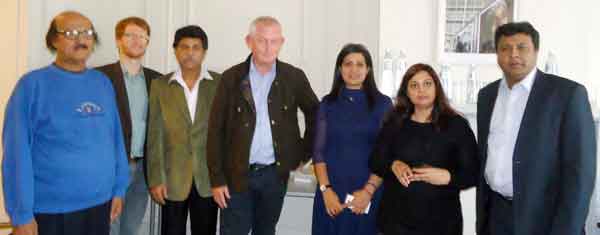To cover the information gap and to provide a dialogue exchange with the officials of EU Commission FES Pakistan office in coordination with its Brussels office organised a Pakistani delegation to Brussels, home city to the headquarters of the European Union.
The delegation members comprised of the leadership of representative trade union organisations and institutions as well as a representative of Workers Employers Bilateral Council of Pakistan.
The delegation was also joined by Pakistan’s Economic Minister based in Brussels. The delegate met with the officials of European External Action Service and the Directorate of Trade and Sustainable Development, GSP.
The visit also provided the opportunities to meet representatives of global and European trade unions’ officials.
Pakistani delegation lauded EU’s role for economic and social development cooperation and promotion of human rights in Pakistan. The members valued the decision of EU parliament to award Pakistan GSP+ and stated that it would help the country to overcome its major challenges relating to unemployment, suffering from terrorism and series of natural disasters, energy shortages, labour and human rights, as well as inclusive socio-economic development.

The European Commission appraised the delegation on EU-Pakistan 5-year Engagement Plan which is focused on institutional cooperation in security, democracy, governance, human rights and socio-economic development, trade and investment, and energy.
As per EU policy all general cooperation and trade agreements include human rights clauses and sustainable development chapters to ensure respect of labour and environmental standards, with a clear reference to core labour standards as defined by ILO Conventions.
In discussing the background debate on GSP+ award, the officials recalled the tragic factory accidents in Pakistan and Bangladesh which raised attention of the European Parliament on precarious working conditions prevailing particularly in textiles and garments sectors. To support Pakistan in meeting its socio-economic challenges in general and improving labour governance in particular, the EU parliament decided to grant duty free trade scheme of GSP+ which requires actions by Pakistan government to ensure compliance of international standards on labour and human rights, environment and governance.

Dearth of details on GSP+ compliance monitoring procedures persists among key stakeholders including workers organisations and trade unions of Pakistan. To cover the information gap and to provide a dialogue exchange with the officials of EU Commission FES Pakistan office in coordination with its Brussels office organised a Pakistani delegation to Brussels, home city to the headquarters of the European Union.
The summary of the exchange and deliberation during the delegation’s visit covered the following issues:
- Labour standards compliance is the priority agenda in the context of GSP+ as it is directly concerned with the 60 million workforce of Pakistan;
- Freedom to exercise the rights of association and collective bargaining for workers by removing legal, administrative and work-place barriers for the formation of independent workers unions was stressed as the most effective and sustainable way to ensure compliance of labour standards in the context of GSP+;
- The annual and periodical EU assessment process of labour compliance under GSP+ will attach highest priority to:
- eradication of forced and child labour;
- trade unions rights and collective bargaining, and
- improving labour inspection system in the country;
- EU Directorate of Trade and Sustainable Develop GSP will reference on ILO supervisory mechanism and ILO Committee of Experts’ Report for assessing the application of labour standards. Further, the reports of social partners such as reports of International Trade Union Confederation will also be taken into considerations;
- In order to make tangible progress on compliance of labour standards, the stakeholders in the country need to develop effective medium-term strategy based on annual/biannual level tangible benchmarks for success in each of the core areas ;
- It is necessary to enhance Provincial governments’ capacity to legislate, reform and effectively implement labour laws as labour governance fall under provincial competence. The cooperation of development partners in Pakistan will be required to support the trade unions’ organisation capacities to organise workers in unions;
- The Representative trade union bodies in the country need to be effectively engage in the process of legal framework and regulatory reforms at the provincial and national levels, compliance governance as well as the stakeholders dialogue;
- For effective labour governance reforms including legal, administrative, inspection and reprimanding measures the framework and platform for tripartite dialogue in the country need to be strengthened by instituting
- national and provincial tripartite platform by effectively engaging representative workers and employers organisations with respective governments officials in line with the ratified international conventions;
- dedicated tripartite dialogue at the provincial and national level on annual basis to monitor the progress on labour standards in the context of GSP Plus by engaging the representative workers and employers organisation on key sectors such as textile and garments, brick kilns and agriculture
- encouraging sectoral-level workers employers dialogue to develop social partners’ strategies to accelerate effective implementation of labour standards at work places;
- Importance was expressed that underlying objectives of awarding GSP+ is to promote good governance and sustainable development by ensuring work conditions. These objectives cannot be fulfilled without benefiting vast majority of workforce that is engaged in informal sectors of economy, export processing zones and production supply chains including home-based workers. A strong legal and policy framework is necessary to regulate employment and safety conditions, wages, and social welfare benefits in unregulated sectors of economy;
- While some members countries in EU have formulated individual textile and garment strategies, presently EU is developing targeted programmes for ensuring legal bindings to labour rights and sustainability in buying and supply network of garments and textile products;
- Information such as national score card on compliance and country reports on progress of applications of standards are needed to be shared with all stakeholder including trade unions;
- A stronger role of research, awareness campaign of workers’ awareness and civic advocacy to promote workers rights about GSP+ will facilitate the compliance of labour standards. Need for an easy to utilize guidelines and manuals on GSP+ was also highlighted. It was concurred that ultimately the success of the GSP+ compliance rests on the implementation of labour standards at the work places;
- The discussions also led to issues of workers rights advocacy at international forum and it was recognised that only the representative unions of workers are the most credible bodies to speak, advocate and be engage on workers issues;
- Pakistan’s textiles and garments employs largest workforce in the industrial sector. Garment is one of the most labour intensive and key areas to capitalise on the GSP+ trade benefits. Besides precarious working conditions the sectors face serious shortage of skilled workers. It is important to align the EU-Pakistan development cooperation with the requirements of skill development programmes in garments sector.
The discussion with the representatives of European Trade Unions covered their perspectives on GSP+ and monitoring roles of trade union in EU external relations. Trade union bodies at European levels are part of the political level dialogue on integrating labour standards in trade agreements and implementing workers rights in supply network of imports. They emphasized commitments to advocate for workers rights in Pakistan and other developing countries.
The officials of International Trade Union Confederation informed that ITUC is currently undertaking assessment studies of working conditions in production and supply chains of textile and garments sectors of Bangladesh, Cambodia and Hong Kong, and that it has future plans to do similar studies in Pakistan.

After the Brussels visit the trade union delegates transferred to the German city of Herford to visit a German Textile Company ‘Bugatti’. The management of the company explained the production processes as well as its overseas supply network and purchasing practices from Asian countries. At the plant level Work Councils are elected by employees which deals with the employees-employers relations and form an integral part of plant management.
In Frankfurt the delegates visited the headquarters of IG Metall, the largest trade union of Germany representing workers across various sectors including metal, steels, textile, etc. The officials of IG Metall informed the delegates about benefits of organising as well as wage and working conditions’ bargaining at sectoral levels. The model of organising provides the framework for protecting and promoting workers interests uniformly at sectoral levels beyond plant and individual levels for effectively safeguarding against informalisation and lowering of living and working standards.

The delegation expressed their satisfaction for a detailed exposure to European Commission GSP compliance mechanism and role of workers organisation in monitoring labour standards.
European Union in January 2014 has granted Pakistan a preferential trade agreement through its Special Incentive Arrangements better known as Generalised System of Preferences Plus (GSP+) scheme which allows more than ninety percent of Pakistan’s exports to EU market with zero custom tariffs.
European Union is Pakistan’s second largest trading partner and with GSP+ agreement ward Pakistan is expected to further enhance and diversity its exports to EU countries. The additional revenues and resources can help Pakistan to achieve the scheme’s basic objectives of promoting sustainable development and good governance at home.
The concept of sustainable development and good development are explicitly enshrined in the 27 international conventions of United Nations and International Labour Organisations which Pakistan has ratified before.





